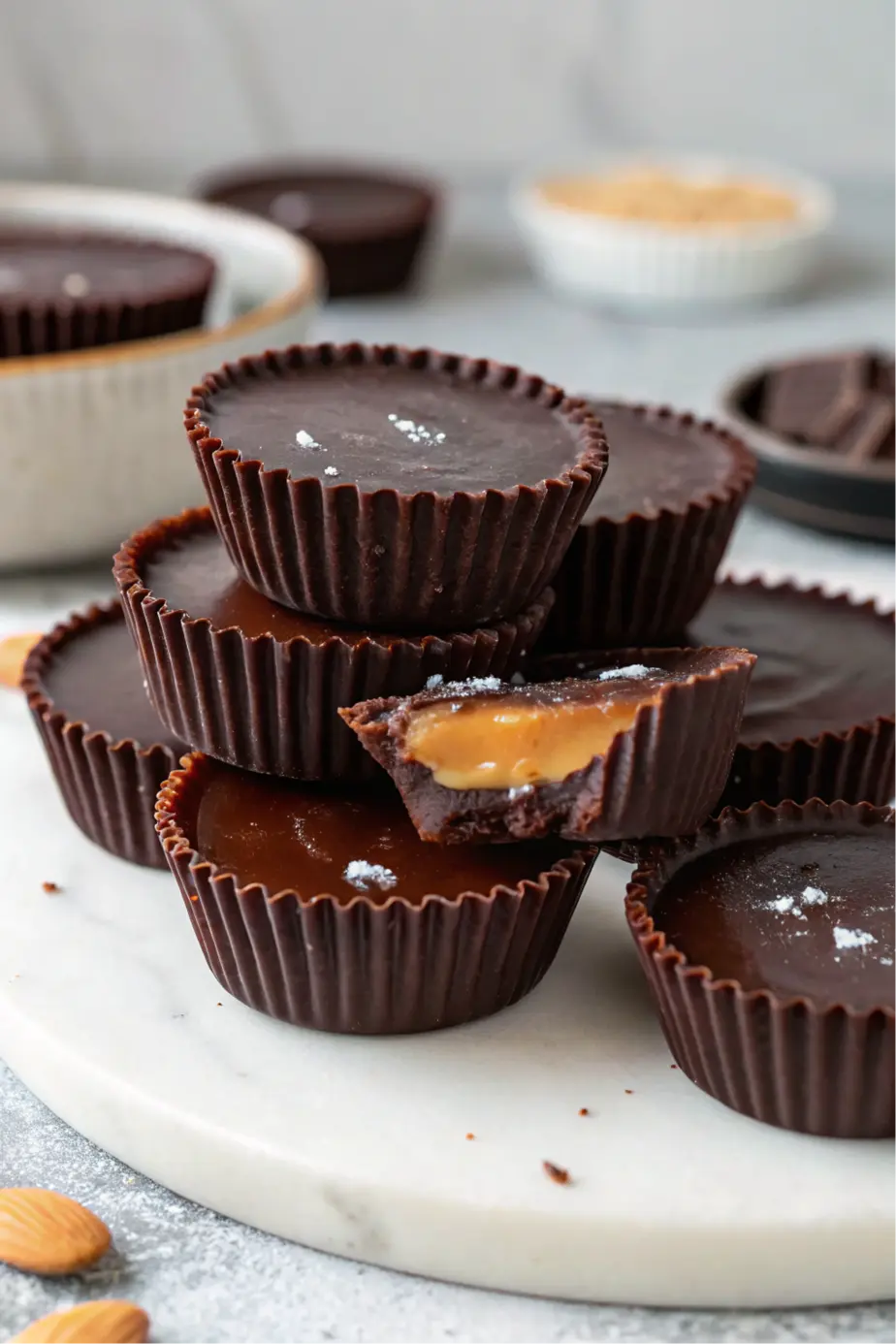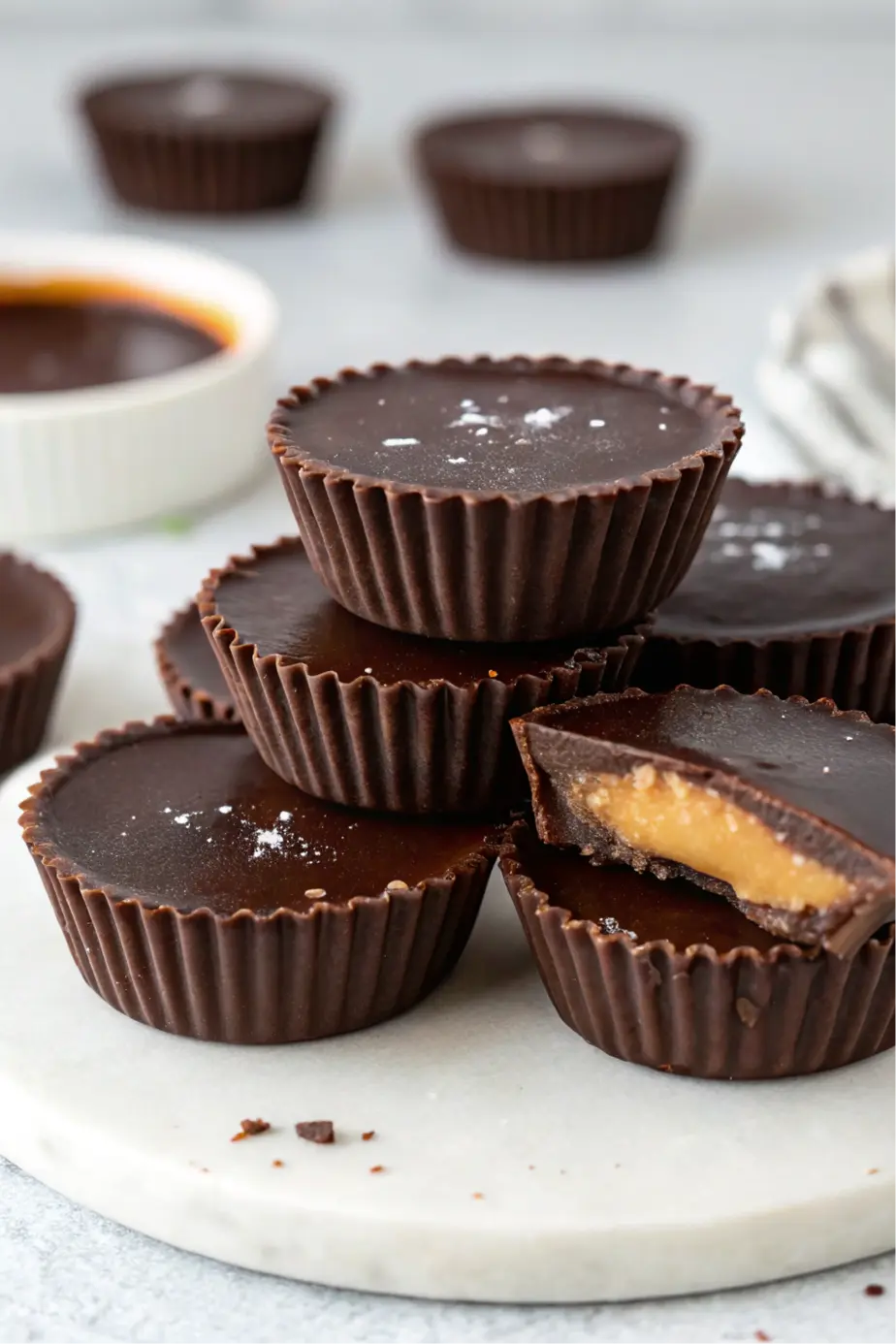Imagine indulging in a treat that not only satisfies your sweet tooth but also offers a range of health benefits. Dark chocolate and peanut butter, a beloved pairing, combine rich flavors with surprising nutritional advantages. The perfect harmony of bitter-sweet dark chocolate and creamy peanut butter can evoke a sense of indulgence while also providing essential nutrients. But what makes this duo so appealing, and more importantly the question is, Is Dark Chocolate with Peanut Butter Good for You?
In this article, we’ll uncover the science-backed benefits of dark chocolate and peanut butter, examine their potential drawbacks, and discover creative ways to incorporate this delightful combination into your diet. Whether you’re looking to satisfy cravings, fuel your body, or simply enjoy a guilt-free snack, this guide has you covered. Keep reading to learn how you can enjoy this delicious pairing responsibly and reap its many advantages without overindulging.
The Detailed Nutritional Breakdown and Health Benefits of Dark Chocolate
Dark chocolate is celebrated not just for its decadent flavor but also for its impressive nutritional profile and health benefits. Unlike milk chocolate, dark chocolate is crafted with higher concentrations of cocoa solids and less sugar, making it a healthier choice for indulgence. Here’s an in-depth look at its composition and why it’s worth including in your diet:
Key Nutritional Highlights
- Rich in Antioxidants: Dark chocolate is abundant in flavonoids, powerful antioxidants that help combat oxidative stress and reduce inflammation in the body.
- Packed with Essential Minerals: It provides significant amounts of magnesium, which aids muscle function, iron for oxygen transport, and zinc to support immunity and skin health.
- Contains Healthy Fats: These fats, particularly monounsaturated fats, are beneficial for heart health when consumed in moderation.
- Low in Sugar: High-quality dark chocolate minimizes sugar content while maximizing cocoa, offering a more health-conscious treat compared to milk chocolate varieties.
Health Benefits of Dark Chocolate
- Supports Heart Health: The flavonoids in dark chocolate have been linked to improved cardiovascular health. They may lower blood pressure, increase circulation, and reduce the risk of heart disease.
- Boosts Brain Function: Dark chocolate promotes better cognitive performance by improving blood flow to the brain and protecting neurons against aging-related damage.
- Boosts Mood: Compounds like serotonin precursors and endorphin boosters in dark chocolate can help reduce stress and boost your mood naturally.
- Improves Skin Health: Flavonoids in dark chocolate can protect your skin against UV damage and improve skin hydration and texture.
- Regulates Blood Sugar: Despite its slightly sweet nature, dark chocolate’s low glycemic index makes it suitable for preventing sharp blood sugar spikes.
Selecting the Best Dark Chocolate
To maximize health benefits, it’s essential to choose the right type of dark chocolate:
- Opt for 70% cocoa or higher for increased antioxidant content and minimal sugar.
- Look for minimal ingredient lists, focusing on cocoa solids, cocoa butter, and natural sweeteners.
- Avoid products with added artificial flavors, oils, or excessive sweeteners.
Incorporating Dark Chocolate into Your Diet
Including dark chocolate in your diet doesn’t have to mean overindulgence. Pair it with nuts, fruits, or peanut butter for a nutrient-dense snack. Use it as a topping for yogurt or oatmeal, or enjoy it in moderation as a standalone treat. By understanding its nutritional value and consuming it thoughtfully, dark chocolate can be a guilt-free addition to your health journey.

Peanut Butter: A Protein Powerhouse
Peanut butter is a creamy, satisfying spread made from ground peanuts. While it’s undeniably delicious, it also boasts an impressive nutritional profile that makes it a staple in many households. Here’s an in-depth look at what makes peanut butter such a powerhouse:
Key Nutritional Highlights
- High in Protein: With around 7-8 grams of protein per 2-tablespoon serving, peanut butter supports muscle growth and repair, making it ideal for active individuals.
- Rich in Healthy Fats: Peanut butter contains monounsaturated and polyunsaturated fats, which contribute to heart health by reducing bad cholesterol levels.
- Packed with Vitamins and Minerals: It’s an excellent source of vitamin E, a potent antioxidant, along with magnesium and potassium, which are crucial for nerve and muscle function.
- Dietary Fiber: A modest amount of fiber helps support digestive health and promotes satiety.
Potential Health Benefits of Peanut Butter
- Energy Source: Peanut butter’s calorie density and healthy fats provide a quick and sustained energy boost, making it a favorite among athletes and busy individuals.
- Weight Management: Its high protein and fat content promotes satiety, helping to curb hunger and reduce the likelihood of overeating.
- Blood Sugar Regulation: When paired with complex carbohydrates, peanut butter can help stabilize blood sugar levels, making it suitable for individuals managing diabetes or blood sugar spikes.
- Heart Health: The monounsaturated fats in peanut butter contribute to lower LDL (bad cholesterol) levels, reducing the risk of heart disease.
- Nutrient Absorption: Consuming peanut butter with nutrient-rich foods like vegetables or whole grains can increase the absorption of fat-soluble vitamins.
Tips for Choosing the Best Peanut Butter
To reap the maximum health benefits, it’s essential to choose the right kind of peanut butter:
- Opt for Natural Varieties: Look for peanut butter with minimal ingredients—ideally just peanuts and a pinch of salt.
- Avoid Added Sugars and Oils: Many commercial brands contain added sugars, hydrogenated oils, and preservatives, which can diminish the health benefits.
- Check for Allergens: Be sure the product is free of cross-contaminants if you have specific dietary restrictions or allergies.
How to Incorporate Peanut Butter into Your Diet
Peanut butter’s versatility makes it easy to include in various meals and snacks:
- Spread it on whole-grain bread or rice cakes for a quick and healthy snack.
- Add a dollop to oatmeal or yogurt for a protein-packed breakfast.
- Blend it into smoothies for a creamy texture and added nutrients.
- Use it as a dip for celery, carrots, or apple slices.
- Stir it into sauces or marinades to create a rich, nutty flavor for savory dishes.
By choosing high-quality peanut butter and enjoying it in moderation, you can make it a valuable addition to your diet, whether as a standalone snack or a versatile ingredient in meals.
Is Dark Chocolate with Peanut Butter Good for You?
The combination of dark chocolate and peanut butter is not only indulgent but also offers several health benefits. When consumed in moderation, it can be part of a balanced diet. Here’s why:
Synergistic Health Benefits
- Nutrient-Dense Snack: Combining dark chocolate’s antioxidants with peanut butter’s protein and healthy fats makes for a nutrient-rich treat.
- Heart Health Support: The healthy fats in peanut butter complement the heart-friendly flavonoids in dark chocolate.
- Energy and Satiety: This duo provides a balanced mix of carbohydrates, fats, and protein to keep you full and dynamize.
Tips for Choosing the Best Products
- Opt for Natural Peanut Butter: Look for options with no added sugars or hydrogenated oils.
- Choose High-Quality Dark Chocolate: Aim for at least 70% cocoa content for maximum health benefits.
- Watch Serving Sizes: A small portion can satisfy cravings without overloading on calories.

How to Incorporate Dark Chocolate and Peanut Butter into Your Diet
Adding this combination to your meals can be both delicious and nutritious. Here are some ideas:
Healthy Snack Ideas
- Dark Chocolate Peanut Butter Cups: Make your own at home with natural ingredients.
- Smoothies: Blend a piece of dark chocolate, a tablespoon of peanut butter, a banana, and almond milk.
- Dip for Fruits: Use this combination as a dip for apple slices or strawberries.
Creative Recipes
- Overnight Oats:
- Ingredients: Rolled oats, almond milk, dark chocolate shavings, and a dollop of peanut butter.
- Preparation: Mix the ingredients and refrigerate overnight for a quick breakfast.
- Dark Chocolate Peanut Butter Bark:
- Ingredients: Melted dark chocolate, a swirl of peanut butter, and a sprinkle of sea salt.
- Preparation: Spread on parchment paper, let it harden, and break into pieces.
Are There Any Downsides?
While the combination of dark chocolate and peanut butter can be healthy, there are some potential drawbacks to consider:
- Calorie-Dense: Both foods are high in calories, which can lead to weight gain if overconsumed.
- Added Sugars: Some commercial products contain added sugars and artificial ingredients, diminishing their health benefits.
- Allergies: Peanut allergies are common, so this treat is not suitable for everyone.
How to Enjoy Dark Chocolate and Peanut Butter Responsibly
To maximize the benefits and minimize the downsides:
- Practice Portion Control: Stick to small servings, such as one or two squares of dark chocolate with a teaspoon of peanut butter.
- Check Labels: Avoid products with added sugars, oils, and preservatives.
- Balance with Other Foods: Pair this combination with fruits or whole grains for a balanced snack.
FAQs: Is Dark Chocolate with Peanut Butter Good for You?
❓ Is dark chocolate with peanut butter a healthy combination?
Yes, when consumed in moderation, dark chocolate with peanut butter can be a nutrient-dense treat. It combines antioxidants from dark chocolate with protein and healthy fats from peanut butter, supporting heart health, energy levels, and mood.
❓ What are the health benefits of dark chocolate?
Dark chocolate is rich in antioxidants, supports heart health, boosts brain function, mood, and improves skin health. Its low glycemic index also helps regulate blood sugar levels.
❓ What should I look for when choosing dark chocolate and peanut butter?
Choose dark chocolate with at least 70% cocoa for maximum health benefits and opt for natural peanut butter without added sugars or hydrogenated oils to make sure you’re getting the most nutritional value.
❓ Are there any downsides to eating dark chocolate with peanut butter?
While beneficial in moderation, these foods are calorie-dense, and overconsumption could lead to weight gain. Additionally, some products may contain added sugars or preservatives, and peanut allergies could be a concern for some individuals.
Final Verdict: Is Dark Chocolate with Peanut Butter Good for You?
When consumed in moderation, dark chocolate with peanut butter is a delicious and nutritious treat. It provides a mix of antioxidants, healthy fats, and protein, making it a satisfying and energizing snack. However, choosing high-quality ingredients and paying attention to portion sizes are crucial for reaping its benefits without overindulging.
In conclusion, enjoy this delightful duo as part of a balanced diet to satisfy your cravings while supporting your overall health.
For a delightful way to enjoy this pairing, check out our recipe for Healthy Homemade Dark Chocolate Peanut Butter Cups. These homemade treats offer a wholesome and delicious option to indulge responsibly while reaping the health benefits of this dynamic duo.
Don’t miss out on more great ideas for healthier baking and cooking. For additional tips, recipes, and updates, follow us on Chaynez Recipes to access our latest posts and social media links.






